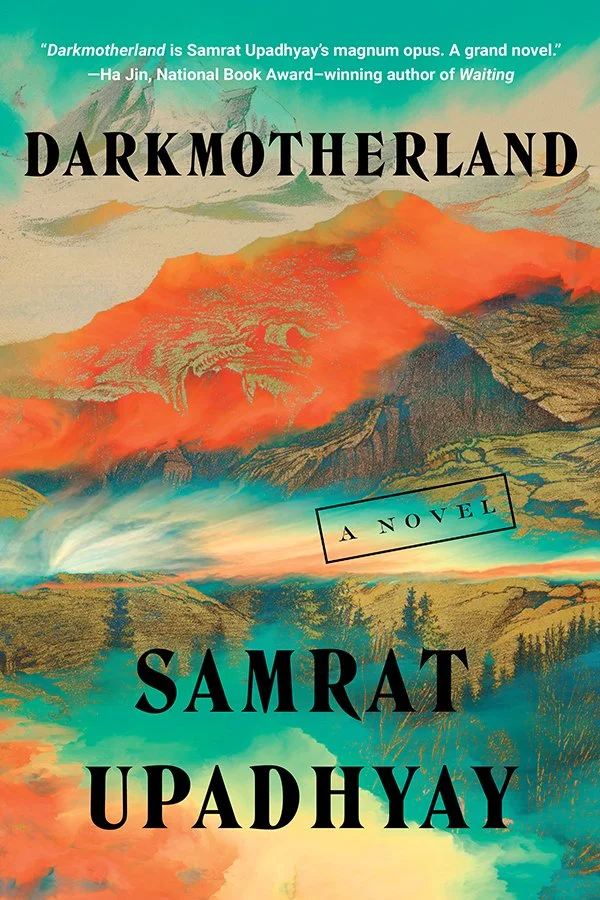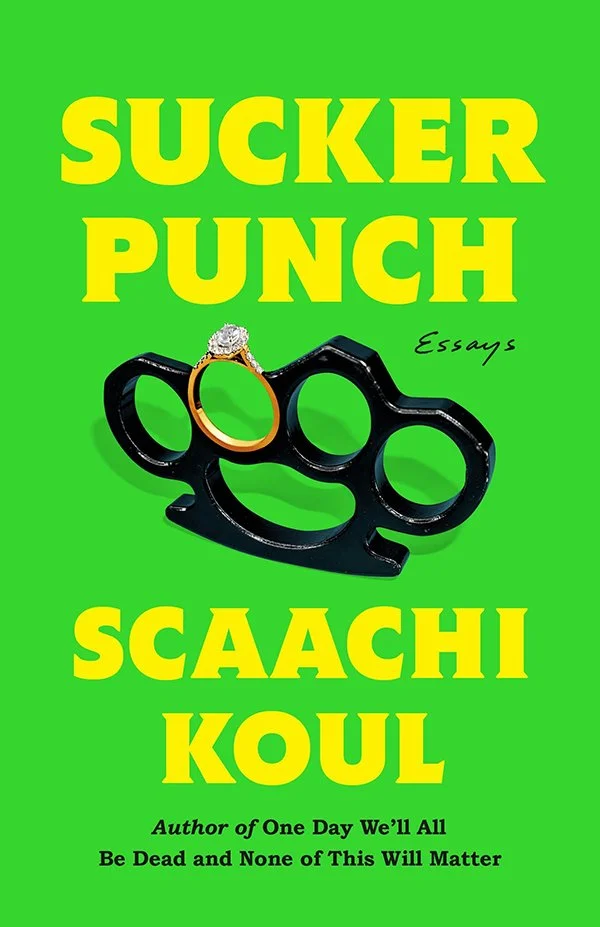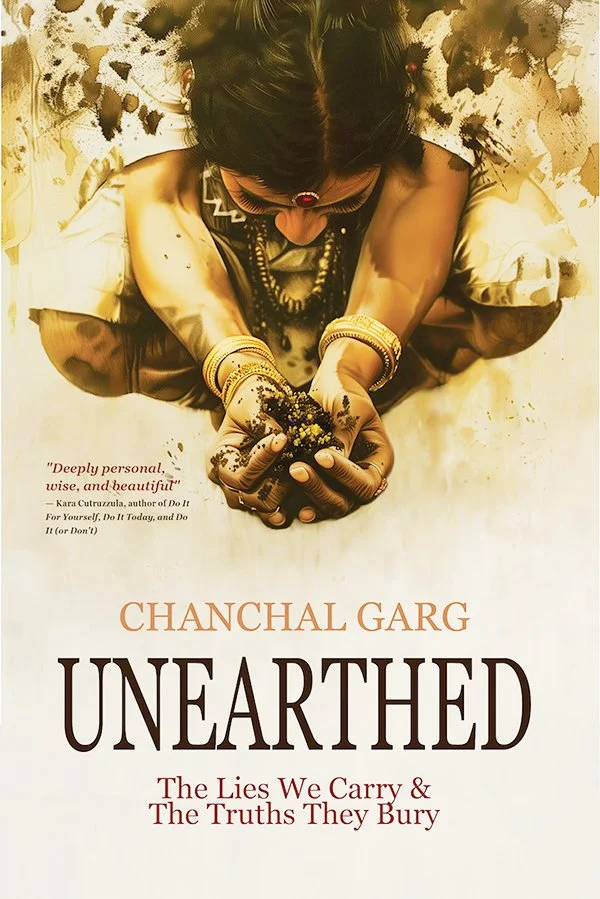BOOKWORM
SHADES OF FEAR
Darkmotherland by Samrat Upadhyay, Soho, $42. Samrat Upadhyay’s novel is teeming with characters. Lovers and widows, dictators and dissidents, paupers, fundamentalists, and a gender-queer power player with her eyes on the throne. At 759 pages, they have ample room to romp around in this earthquake-ravaged dystopian reimagining of the country he comes from – Nepal.
Kranti, a revolutionary’s daughter, marries into a plutocratic dynasty and becomes ensnared in the family’s politics. And Darkmotherland’s new dictator’s mistress Rozy grows into a figure of immense power. It’s a disturbing tale, one that took me a little while to get into, but one soon realizes that Upadhyay brings an intimate, if irreverent knowledge of what he writes to the narrative. Dissidents who are called Beggars because they congregate on Beggar Street. Mothercry Press, their “underground publication” that their opponents dismissed as being named so because of it physical location in a basement. Amrikan President Corn Hair. Poolis uncles who intercept messages. Bhureys – or bhu-kampa (earthquake) rey-fugees.
A social satire, it is disturbingly familiar.
MOVING ON
Sucker Punch by Scaachi Koul, Alfred A Knopf, $34.95. Scaachi Koul’s first book One Day We’ll All Be Dead and None of This Will Matter, was a collection of raw, perceptive and hilarious essays dealing with issues of race, body image, love, friendship and growing up the daughter of immigrants. She assumed her next book would be an update – on the four-day wedding, domestic bliss, and her never-ending arguments with her parents. Instead, the pandemic hit, her marriage fell apart, she lost her job and her mother was diagnosed with cancer.
And Koul was left wondering how to share these updates with family, friends and complete strangers who felt they knew her enough through her writing to offer suggestions and judgement. And yet, she struggled with how not to. Her original sin, she admits, was writing about herself during the personal essay boom. “I still struggle with the personal sheddings I leave all over the internet”.
In spite of being harassed routinely online – it’s just a part of the job, she writes – she was anxious about “the performance of divorce online”.
Sharing didn’t always come easy to her. There was the time she told her classmate Lana about a fight she had with her mother.
“Paye thraat,” my mother had barked at me, which roughly translated means, “I hope lightening falls on you”.
“Wow,” Lana responded. “Sounds like she wasn’t ready to be a mother.”
Koul wanted to defend her mother, to explain that it didn’t mean anything. That her dad screamed paye thraat at the VCR for failing to record 60 Minutes.
It took time for her to recognize just who she was, to come to terms with and even like herself. During the pandemic, she writes, “I spent time with myself and grew to hate her”. In a brutal peeling away of layers, she confesses to not even knowing the woman who wrote her first book. She didn’t manufacture or omit details. She blurred them, just enough to create a story that would explain the “shape of her devastation” without casting the perpetrator as a villain. And the man she went on to marry as the knight in shining armour he would turn out to not resemble even remotely.
I’ll edit my own story down so that the reader laughs instead of winces.
So this book is Koul setting the record straight.
No one likes getting punched in the stomach, but a sucker punch hurts the body and the ego. I’m tired of being shocked by pain.
This is Koul moving on.
Side note: Koul describes visits to the temple during which her mother would “leave flower petals at Sita and Krishna’s feet, a couple whose marriage was cemented by Sita’s dedication to her husband and to her purity”. Except that Sita is Rama’s wife and her mother would have found Radha with Krishna at the temple.
Oh, well.
SONGS AND STORIES OF OUR LIVES
Songs of My Grandmother by Sara Surani, Hay House, $19.99. Sara Surani weaves together the songs of her ancestors, voices of women she has met across the world and her own reflections. She shares deeply personal and moving melodies of memory and spirit, love and laughter, curiosity and wonder, and of healing and hope.
The daughter of Pakistani-Muslim immigrants who moved to South Texas to give their daughter a better life describes her efforts to manifest her family’s dreams for her:
Mama didn’t realize
that between our two lands
is not more land,
but water
and air,
And one cannot stand on water and air
On what happens when systemic violence, hate crimes, and discrimination become normalized:
You don’t move your hand.
You leave it there until I start to normalize the pain, until the pain starts to feel like a part of me,
until your hand starts to feel like my own.
Growing up, listening to her nani’s stories, she yearned to become everything her grandmother could not.
I’m not a problem that needs to be solved but rather, a being made of hundreds of stories that just needs to be listened to.
In places this comes across as a tad flaky, but for the most part, it’s incredibly evocative and beautiful.
And there’s the priceless image of generations of women from her family all seated together, massaging coconut oil and love into each other’s hair.
WHAT LIES BENEATH
Unearthed: The Lies We Carry and the Truths They Bury by Chanchal Garg, $26.99. Before she was Chanchal she was Gangotri. And before that, Nirmal or Nimmi.
The memoir from speaker and conscious leadership facilitator Chanchal Garg is the story of a dutiful Indian daughter raised in America and taught the importance of tradition. She devoted herself to her religion and culture, and the idea of one day becoming a good wife. But, when she sought belonging in the teachings of a charismatic spiritual guru, she found herself trapped in a pattern of abuse that would take years to untangle.
He “was the center of my life. Anything was worth giving up for him. The cost of this mindset would make itself known decades later”.
The guru’s hold was absolute.
She asked him for a new name and became Gangotri. The young man she was to marry, also a devotee/follower, asked him for permission to marry. When she wanted to leave the abusive marriage, she again sought permission to do so. From the same man who had raped her the night before her wedding. Because unable to make sense of his actions, she had convinced herself that maybe he did it because she was special.
The abuse which had continued over the years – every time she met him – carried into her second marriage. For which she had again sought the man’s blessings. She placed his photograph on the dashboard of her car – he was her protection.
She finally wanted to break free from her enthralled state when she was expecting her second child, a daughter, and shared her experience with her parents and her husband. Her parents said they didn’t blame the man and her husband indicated that she was in some way responsible for having allowed the abuse to continue for so long.
It was only when she opened up in the training group formed at Stanford Graduate School of Business that she received the support she needed.
She learned that those experiences didn’t define her. And she chose a new name for herself. Chanchal. Meaning playful, mischievous, she believes it has had a huge role in setting her free.
Her mind “resisted fiercely, clinging to old patterns of disconnection and avoidance. The wisdom of my body however, once faint, had grown too loud to ignore. And I was finally learning how to listen.”
Garg now runs a thriving coaching business and facilitates Stanford’s most popular course on interpersonal dynamics.
Side note: She refers to the independence movement as “India’s revolution”.
SO MUCH TO BEAR
Night Watch by Jayne Anne Phillips, Vintage Books, $24.95. In 1874, in the aftermath of the Civil War, erasure, trauma and namelessness haunt civilians and veterans, renegades and wanderers.
Twelve-year-old ConaLee remembers her mother reading to her in happier times, but finds herself taking on the role of her mother’s primary caregiver, and that of the babies fathered by the man who calls himself their Papa, but is someone who has forced himself into their world.
There’s so much going on in this book, so many elements and themes intertwine that navigating all the ensuing drama is a task. Also it’s hard at times to decipher if there’s a conversation taking place or someone is describing something because of the complete absence of quotation marks.
What was fascinating in this Jane Eyre meets a Hindi movie with predictable twists and turns is the description of how humane things were at the Trans-Alleghany Lunatic Asylum in West Virginia. Notes from physicians include ones on the importance of fresh air and carriage rides for patients. Night Watch won the Pulitzer Prize in 2024.
A FEARSOME NEAR-FUTURE
The Citizen Sainik by Sam Mukherjee, Club Lighthouse Publishing, INR 449 on Amazon.in. We read of children being recruited by militia to fight their wars. Imagine a world in which the US trains and unleashes young people to counter terrorism.
When almond milk-guzzling Chi-rag Roshan, 17, is recruited to be trained as a “citizen sainik”, is the solution any less frightening than the problem?
Heads roll, eyeballs pop – I kid you not –and all manner of mayhem unfolds. Young adults raised on the current crop of books will love the wild ride that is The Citizen Sainik while their parents, who found Goosebumps scary (for their kids), will delight in the sly humour.
Sam Mukherjee’s page-turner time travels to a fearsome and very possible near future.
The book comes with a glossary of terms which includes real words in Indian languages, made-up words the kids use and expressions such as YouTubed. Which Mukherjee uses to indicate brainwashed! “Kewl beans,” as Chirag would say.
TEEN REVIEW
By SAESHA OJHA
Little Women by Louisa May Alcott, Penguin Random House, 24.95. Little Women has been treasured by generations of children. Though set in 1868, the themes of jealousy, pride, sisterhood, and the blossoming of an individual stay forever relevant.
This book is an imaginative and curious novel that follows Jo, Amy, Beth and Meg through their journeys of growing up and learning how to navigate life.
Little Women depicts the path of finding those you can count on and growing with them as people, showing the everchanging, unique identities that each one of us possesses.
Louisa May Alcott perfectly captures the human essence by showing the girls’ flaws, hobbies, and opinions and how those things impact their choices in life. Though the book is incredibly dramatic and romanticized for showing the lives of ‘little women’, I believe it perfectly encapsulates the feelings of children towards their realities.
Louisa May Alcott was ahead of her time with this work of art, similar to Anne of Green Gables by L.M Montgomery, capturing the wild spirits of youth. I recommend this book to anyone of any age who is willing to relive the fond memories of their youth or discover the thrills of the youth they are living in.
• Saesha Ojha is a youth volunteer at Brampton Library.







